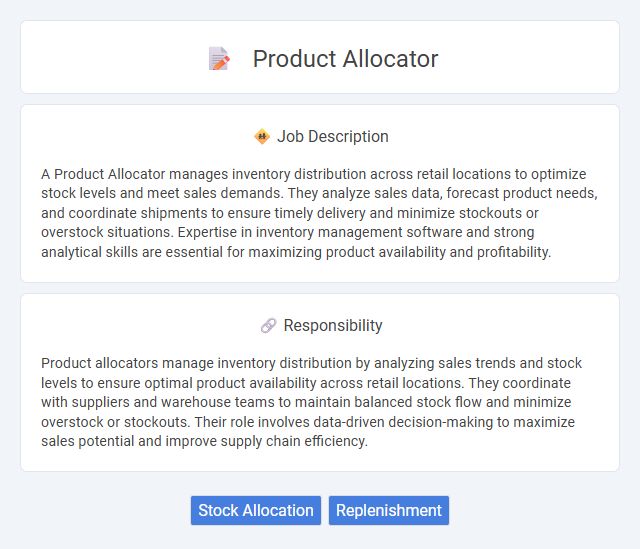
A Product Allocator manages inventory distribution across retail locations to optimize stock levels and meet sales demands. They analyze sales data, forecast product needs, and coordinate shipments to ensure timely delivery and minimize stockouts or overstock situations. Expertise in inventory management software and strong analytical skills are essential for maximizing product availability and profitability.
Individuals who are detail-oriented, organized, and comfortable working with inventory systems are likely to find the product allocator role suitable. Those who thrive in fast-paced environments and can manage multiple priorities simultaneously may have a higher probability of success. Conversely, people who struggle with multitasking or have difficulty maintaining accuracy under pressure might find this job challenging.
Qualification
A Product Allocator typically requires strong analytical skills and proficiency in inventory management software to optimize stock levels across multiple locations. Experience in supply chain logistics, demand forecasting, and data analysis enhances the ability to make informed allocation decisions. A background in business, logistics, or supply chain management, often supported by a bachelor's degree, is highly valued for effective product distribution and sales maximization.
Responsibility
Product allocators manage inventory distribution by analyzing sales trends and stock levels to ensure optimal product availability across retail locations. They coordinate with suppliers and warehouse teams to maintain balanced stock flow and minimize overstock or stockouts. Their role involves data-driven decision-making to maximize sales potential and improve supply chain efficiency.
Benefit
A product allocator job likely offers the benefit of gaining expertise in inventory management and supply chain logistics, enhancing skills valuable in retail and wholesale sectors. This role may provide opportunities to improve decision-making abilities by analyzing sales data and product demand to optimize stock distribution. Employees in this position probably enjoy increased responsibility and the potential for career advancement within merchandising and operations management.
Challenge
The role of a product allocator likely involves managing inventory distribution across multiple locations, which presents the challenge of predicting demand accurately to prevent overstocking or stockouts. Balancing supply constraints with fluctuating market trends may require continuous analysis and quick decision-making under pressure. Navigating these complexities demands strong problem-solving skills and adaptability to ensure optimal product availability and customer satisfaction.
Career Advancement
A Product Allocator plays a crucial role in supply chain management by optimizing inventory distribution to retail locations, directly impacting sales performance. Mastery of data analysis, forecasting skills, and vendor negotiation enhances a Product Allocator's value, paving the way for promotions to roles such as Senior Allocator, Inventory Manager, or Supply Chain Analyst. Career advancement opportunities often involve transitioning into strategic planning positions or leadership roles within merchandise planning and operations.
Key Terms
Stock Allocation
A Product Allocator specializes in precise stock allocation, ensuring optimal distribution of inventory across various retail locations to maximize sales and minimize excess. They analyze sales trends, inventory levels, and demand patterns using data-driven techniques to allocate products efficiently. Effective stock allocation by a Product Allocator enhances supply chain performance and supports inventory turnover goals.
Replenishment
A Product Allocator specializes in managing inventory levels to ensure optimal replenishment across retail locations, balancing supply and demand effectively. Their role involves analyzing sales data, forecasting inventory needs, and coordinating with warehouses to maintain stock availability while minimizing excess. Efficient replenishment strategies led by Product Allocators directly impact customer satisfaction and profitability by preventing stockouts and reducing overstock situations.
 kuljobs.com
kuljobs.com